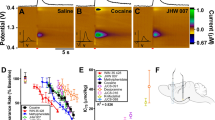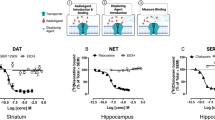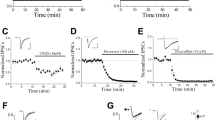Abstract
The inhibitory effect of ethanol on neurotransmitter release1,2 has been suggested to be due to either reduced Ca2+ entry3 or increased removal of free intracellular Ca2+ from the synapse4. The use of the Ca2+ ionophore, A23187, to allow direct access of external Ca2+ to the presynaptic interior5 should help to determine which of these two factors is the more important, as ethanol should inhibit A23187-induced release of transmitter only if increased Ca2+ removal from the synapse is important. Here we show in rat striatal slices that, although 3H-dopamine release evoked by depolarization with 40 mM K+ is inhibited by 50 mM ethanol, the release evoked by A23187 is enhanced by the presence of ethanol in vitro. The results suggest that ethanol reduces depolarization-induced transmitter release by reducing Ca2+ entry to the presynaptic terminal. However, for brain slices taken from rats made tolerant to ethanol, 3H-dopamine release in the absence of ethanol showed altered characteristics; both K+ depolarization and A23187 released a significantly greater fraction of 3H-dopamine from these slices than from controls. Thus tolerance to the inhibitory effect of ethanol on release may develop by a mechanism involving increased sensitivity of the terminal to Ca2+ entry.
This is a preview of subscription content, access via your institution
Access options
Subscribe to this journal
Receive 51 print issues and online access
$199.00 per year
only $3.90 per issue
Buy this article
- Purchase on Springer Link
- Instant access to full article PDF
Prices may be subject to local taxes which are calculated during checkout
Similar content being viewed by others
References
Carmichael, F. J. & Israel, Y. J. Pharmac. exp. Ther. 193, 824–834 (1975).
Kalant, H. & Grose, W. J. Pharmac. exp. Ther. 158, 386–393 (1967).
Harris, R. A. & Hood, W. F. J. Pharmac. exp. Ther. 213, 562–568 (1980).
Michaelis, E. K. & Myers, S. L. Biochem. Pharmac. 28, 2081–2087 (1979).
Akerman, K. E. O. & Nicholls, D. J. Eur. J. Biochem. 115, 67–73 (1981).
Deleers, M., Couturier, E. & Malaisse, W. J. Cell Calcium 2, 159–171 (1981).
Grieve, S. J. & Littleton, J. M. J. Pharm. Pharmac. 31, 605–610 (1979).
Littleton, J. M., John, G. R. & Grieve, S. J. Alcohol. clin. exp. Res. 3, 50–56 (1979).
Chin, J. H., Parsons, L. M. & Goldstein, D. B. Biochim. biophys. Acta 513, 358–363 (1978).
Rottenberg, H., Waring, A. & Rubin, E. Science 213, 583–584 (1981).
Clark, J. W., Kalant, H. & Carmichael, F. J. Can. J. Physiol. Pharmac. 55, 758–768 (1977).
Tabakoff, B. in Alchohol and Opiates (ed. Blum, K.) 21–40 (Academic, New York, 1977).
Heron, D. S., Shinitzky, M., Zamir, N. & Samuel, D. Biochem. Pharmac. 31, 2435–2438 (1982).
Author information
Authors and Affiliations
Rights and permissions
About this article
Cite this article
Lynch, M., Littleton, J. Possible association of alcohol tolerance with increased synaptic Ca2+ sensitivity. Nature 303, 175–176 (1983). https://doi.org/10.1038/303175a0
Received:
Accepted:
Issue Date:
DOI: https://doi.org/10.1038/303175a0
This article is cited by
-
Acamprosate Produces Its Anti-Relapse Effects Via Calcium
Neuropsychopharmacology (2014)
-
Effects of ethanol on calcium homeostasis in the nervous system
Molecular Neurobiology (1999)
Comments
By submitting a comment you agree to abide by our Terms and Community Guidelines. If you find something abusive or that does not comply with our terms or guidelines please flag it as inappropriate.



